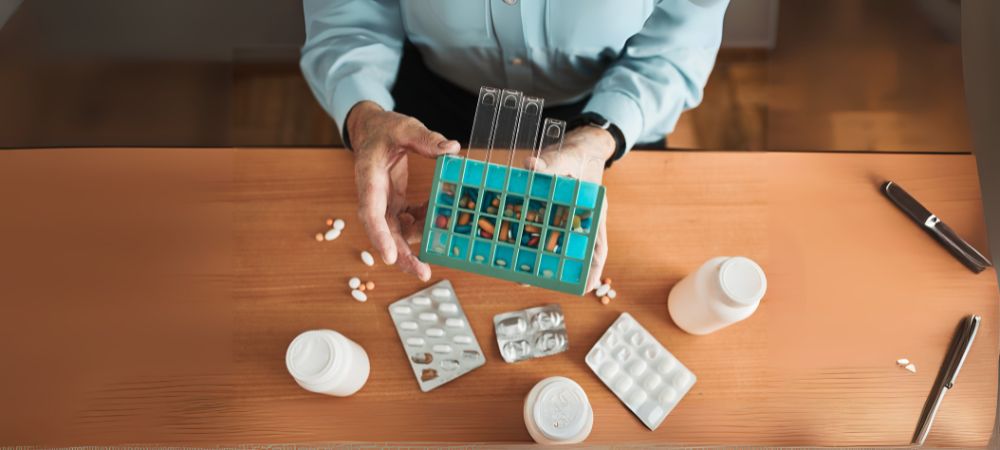Recently updated on October 16th, 2025 at 11:48 am
Are you worried about your elderly parent taking the wrong pill or forgetting a dose?
You’re not alone. Many families face the same concern.
Senior medication management is one of the most important parts of keeping older adults healthy and safe at home. When a senior is taking the right medication, in the right amount, at the right time, they are less likely to suffer from health setbacks.
But as we age, remembering and managing medications becomes harder. Memory changes, vision problems, and complicated prescriptions can make things risky. That is why many families turn to caregivers for help.
In this guide, we are going to provide you with the practical steps you can take to help seniors with medication management.
30 Seconds Summary
- Seniors often take many medications (polypharmacy), which increases the chance of errors.
- Tools like pill organizers and reminder systems improve medication adherence in seniors.
- Watch for side effects or signs of overmedication in elderly loved ones.
- Non-medical caregivers can help with reminders, organization, and safety checks.
Why Medication Management Is Important for Seniors?

As people age, their bodies process drugs differently. According to the U.S. Food and Drug Administration (FDA), age-related changes in the liver and kidneys can slow how medicines are broken down and leave the body. This can cause drugs to build up in the system, increasing the risk of harmful side effects or drug interactions. That is why it is important for seniors, and the people helping them, to regularly review medications with a healthcare professional.
This makes it easier for medications to build up and cause side effects. Some seniors take five or more prescriptions daily. This is called polypharmacy, and while necessary for some conditions, it increases the risk of drug interactions and mistakes.
NIH research shows that nearly 30% of hospital admissions in older adults are linked to medication problems, often due to missed doses, overdoses, or drug interactions.
Senior medication safety is not just about taking pills on time. It is also about making sure the medication is still right for their condition and does not clash with other drugs or foods.
Some of the most common challenges when seniors manage their own medication include:
- Forgetting doses or taking them twice by mistake.
- Trouble opening bottles or reading small labels.
- Skipping medicines because of side effects or confusion.
- Managing prescriptions from different doctors without coordination.
Tip: To avoid all that, you should keep an updated list of all medications, doses, and schedules in a visible place like the fridge door.
If you want a safe, reliable way to handle prescriptions for your loved one, click here to learn more about Loving Homecare’s senior medication management services today.
What are the Main Medication Risks for Seniors?

Even the most careful senior can run into medication problems. Age changes how the body reacts to medicine, and many older adults take several prescriptions at once. According to the Agency for Healthcare Research and Quality (AHRQ), older adults discharged with five or more prescriptions face higher risks of ER visits and re-hospitalization. Knowing the common risks can help families and caregivers prevent them and improve senior medication safety.
1. Side Effects of Mental Health Drugs in Seniors
Medications for depression, anxiety, or memory issues can be very helpful, but psychiatric medication for seniors often acts differently than in younger people. They may cause stronger side effects such as dizziness, confusion, upset stomach, or trouble sleeping. In some cases, these side effects can raise the risk of falls or make daily activities harder.
Families managing medications for elderly parents should check in regularly with the doctor to review doses and watch for any changes in mood, alertness, or balance.
2. Signs of Overmedication in the Elderly
It’s not always easy to tell if an older adult is taking too much medicine, but some warning signs include:
- Unusual sleepiness during the day
- Sudden confusion or memory problems
- Loss of balance or more frequent falls
- Slurred speech or trouble forming words
Recognizing these signs of overmedication in elderly loved ones early can prevent serious health issues. If you notice these symptoms, speak with your healthcare provider right away.
3. Preventing Medication Errors in the Elderly
Preventing medication errors in elderly loved ones starts with a clear system. The right tools and habits can improve medication adherence in seniors and make daily life safer. Here are some medication management tips for seniors:
- Use a labeled pill organizer
- Keep a written or digital schedule for when to take each medicine.
- Avoid storing loose pills together to prevent mix-ups.
- Consider setting phone reminders, using smart pill dispensers, or arranging in-home caregiver medication reminders.
Knowing how to organize medications for a senior can save time, reduce stress, and keep them healthy. In many cases, the role of a caregiver in medication management is essential; they can help prepare doses, offer gentle reminders, and watch for side effects. Even non-medical support for medication adherence can make a big difference in keeping your loved one safe.
Practical Medication Management Tips for Seniors
Good medication habits can be the difference between staying healthy and ending up in the hospital. Here are some easy, proven ways to help:
1. Use a Pill Organizer / Pillbox
By using a pill organizer or a pill box, you can sort pills by day and time. This reduces confusion and makes it clear if a dose has been taken.
2. Set Reminders
Use phone alarms or talking reminder devices. These are especially useful for medication adherence in seniors with memory issues.
3. Create a Medication Schedule
A printed chart with the medication name, dose, and time helps seniors and caregivers follow the plan.
4. How to Help an Elderly Parent Remember Medication?
- Keep medicines in a visible place (but out of reach of children).
- Link pill times to daily habits, like after breakfast.
- For memory loss, try medication reminder tips for seniors with dementia, like using picture labels.
5. My Mom Forgets to Take Her Pills – What Do I Do?
If reminders aren’t enough, a caregiver can check in daily. This not only ensures pills are taken but also provides companionship.
If you need help organizing and tracking your loved one’s prescriptions, Loving Homecare’smedication management services ensure every dose is taken safely and on time.
Medication Reminder Tips for Seniors with Dementia
Dementia and Alzheimer’s make medication management harder. People may forget they already took a pill and take it again, or refuse it altogether.
Some of the helpful ways to counter such situations include:
- Color-coded pill organizers.
- Using the same caregiver daily for routine and trust.
- Avoid overwhelming the senior with too much information at once.
Caregivers trained in dementia care can:
- Give gentle verbal reminders.
- Watch for changes in mood or health after medication.
- Report concerns to the family or doctor quickly.
Loving Homecare provides patient, consistent dementia medication management so your loved one’s prescriptions are handled with care and understanding.
The Role of a Non-Medical Caregiver in Medication Support
Families often ask, “Can a home caregiver give medication?” The answer depends on the state’s rules. In California, non-medical caregivers cannot decide doses or physically administer pills, but they can:
- Offer in-home caregiver medication reminders.
- Read labels out loud.
- Open bottles or packages.
- Keep a medication log.
- Help with refills by coordinating with the pharmacy.
- Alert the family if they notice new symptoms or side effects.
However, they cannot:
- Change the medication or dose.
- Give injections or IVs.
- Fill the pill organizer unless trained and authorized by the family or nurse.
By providing reminders and structure, caregivers play a big role in non-medical support for medication adherence.
If your loved one needs daily assistance, Loving Homecare’sLive-In Home Care Services provide 24/7 support for safe medication routines and independent living.
Medication Management Systems for Seniors
For seniors with complex needs, medication management systems can be a lifesaver. These include:
- Smart pill dispensers with lock features.
- Automatic alarms that only release the correct dose.
- Apps that notify family members if a dose is missed.
When combined with a caregiver’s attention, these systems significantly reduce the risk of mistakes.
FAQs
Q: Can a caregiver fill a pillbox?
A: In many cases, this must be done by a nurse or family member, but caregivers can assist by reminding and checking.
Q: What is polypharmacy?
A: When a person takes five or more medications daily, they increase the risk of drug interactions and side effects.
Q: How can I organize medications for a senior?
A: Use a labeled pill organizer and keep a printed medication schedule visible.
Q: When should I call the doctor about side effects?
A: Immediately if you see sudden confusion, trouble breathing, or unusual weakness.
Q: What are the best medication reminder tools for seniors with dementia?
A: Simple devices with large buttons, talking reminders, and color-coded containers are some of the best medication reminder tools for seniors with dementia.
Over to You
Managing medications for elderly parents is not always easy. But with a clear system, proper tools, and help from a trusted caregiver, it becomes safer and less stressful.
Bring your family peace of mind. If your loved one is in Los Angeles, San Gabriel, or Orange County, contact Loving Homecare today for a free, no-obligation consultation to see how we can support their health and independence at home.
Call (562) 448-3854
Disclaimer: This article is for informational purposes only and does not constitute medical advice. Please consult with a healthcare professional for your loved one’s specific needs
